SIDE DISHES AND ACCOMPANIMENTS
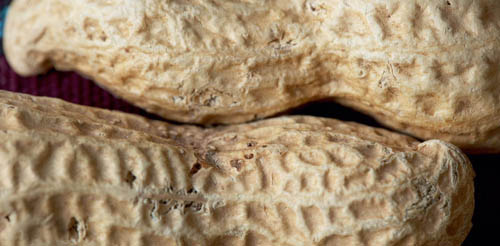
PILAU RICE
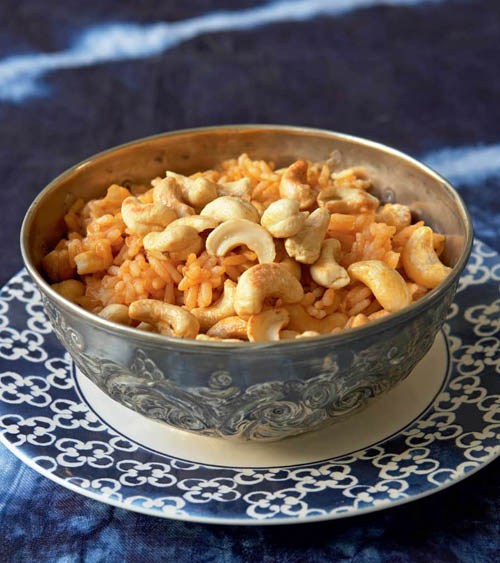
The term ‘pilau’ refers to rice that has been browned in oil and then simmered in a spicy liquid.
- 2 Tbsp olive oil
- 2 onions, chopped
- 2 cups uncooked white rice
- 2 cloves garlic, crushed
- ½ tsp ground cumin
- 1 Tbsp tomato paste
- 8 cups water
- salt and pepper
- ¾ cup cashew nuts
- Heat the oil in a saucepan and sauté the onions for 3 minutes.
- Stir in the rice, garlic, cumin and tomato paste, then add the water, and salt and pepper. Cook for 15 minutes, or until the water has evaporated, and stir in the cashew nuts just before serving. SERVES 4–6
SAVOURY RICE
In Sanskrit basmati means ‘the flavoured one’, which is no surprise as this variety of long-grained rice is extremely tasty and aromatic.
- 2 Tbsp vegetable oil
- 1 Tbsp butter
- 1 onion, finely chopped
- 2 cups white basmati rice
- 1 tsp caraway seeds
- 1 carrot, peeled and diced
- 100 g brown mushrooms, sliced
- 6 cups water
- salt and pepper to taste
- 2 baby marrows, diced
- 100 g shelled peas
- Heat the oil and butter in a pot and sauté the onion until soft. Add the rice and caraway seeds and fry for 2 minutes before adding the carrot and mushrooms. Stir for another 2 minutes, then pour in the water. Season with the salt and pepper and cook for 10 minutes. Finally, add the baby marrows and peas, and cook for a further 5 minutes. Fluff the rice up with a fork, and serve with stews or curries. SERVES 4–6
GREEN BEAN AND TOMATO SALAD
Cherry tomatoes are very attractive in this salad, but if you don’t have any to hand, use sliced standard-size tomatoes instead.
- 500 g green beans, topped, tailed and halved
- 2 small punnets ripe cherry tomatoes, halved
- salt and pepper
- DRESSING
- 5 Tbsp olive oil
- 2 Tbsp white vinegar
- Steam the green beans until they are tender but still crunchy. Arrange the beans and tomatoes in salad bowl. Mix the olive oil and vinegar together and pour over the beans and tomatoes.
- Season to taste with the salt and pepper. SERVES 4–6
NORTH AFRICAN COUSCOUS SALAD
Although the North African city of Carthage had been destroyed in 146 BCE, the Romans re-established it 100 years later and decided that it should be a supplier of wheat to their empire. And so this once agriculturally diverse area became a one-crop province, supplying two-thirds of Rome’s wheat needs. The result was that the Carthaginian diet was dominated by wheat and its by-products, including semolina. Berbers adapted semolina into couscous and spread its popularity throughout North Africa. Couscous refers to both the dry, uncooked semolina pellets as well as to the dish of light and fluffy steamed grains.
- 1 cup uncooked couscous
- 1 cup water
- 1 small onion, chopped
- ¼ english cucumber, finely chopped
- 1 firm tomato, chopped
- ½ bunch fresh mint, chopped
- ½ bunch fresh parsley, chopped
- 8 pitted black olives, chopped
- salt and pepper
- 1 lettuce, leaves separated
- DRESSING
- ¼ cup olive oil
- 2 Tbsp lemon juice
- 2 Tbsp brown vinegar
- salt and pepper
- To make the dressing, combine all the ingredients.
- In a saucepan, combine the couscous and water. Cover and bring to the boil for 3 minutes, or until all the water is absorbed. Leave to cool. Mix in the onion, cucumber, tomato, mint, parsley and olives, as well as the dressing. Stir with a fork to separate the grains. Season with the salt and pepper. If dry, add extra olive oil and lemon juice. Serve on a bed of lettuce. SERVES 4–6
MALAWI’S FAVOURITE CABBAGE SALAD
This is Malawi’s more interesting version of the common coleslaw. The dressing is the secret!
- ½ medium green cabbage, finely shredded
- 2 carrots, peeled and grated
- 1 onion, chopped
- 1 yellow pepper, finely julienned
- 1 red pepper, finely julienned
- ¼ cup unsalted peanuts
- 1½ cups finely shredded red cabbage
- DRESSING
- 1 tsp Dijon mustard
- 4 Tbsp olive oil
- 150 ml vinegar
- 150 ml vegetable oil
- 1/3 cup brown sugar
- To make the dressing, stir all the ingredients together until the sugar has dissolved.
- Toss all the salad ingredients together in a salad bowl, pour over the dressing and serve immediately. SERVES 4–6
CUCUMBER AND BABY MARROW SALAD
This salad is particularly attractive as the thin slices of cucumber and baby marrow create a ribbon effect. Use a potato peeler to achieve these ultra-thin slices.
- 3 English cucumbers, thinly sliced lengthways
- 10 baby marrows, thinly sliced lengthways
- ¼ cup olive oil
- 1 cup roasted cashew nuts
- DRESSING
- ¼ cup olive oil
- 3 Tbsp white vinegar
- 1 tsp wholegrain mustard
- 1 tsp honey
- 1 Tbsp chopped fresh coriander
- Place the cucumber slices in a bowl. Heat a cast-iron griddle. Toss the baby marrows with the olive oil and grill for 1 minute on each side. Add to the cucumber and mix in the cashew nuts. Mix the dressing ingredients together and pour over the cucumber and baby marrows. Toss gently and serve at once. SERVES 4–6
COCONUT RICE
If you add coconut milk to ordinary white rice it makes a wonderful accompaniment to any curry dish.
- 2 × 400 ml cans coconut milk
- 1 cup water
- 3 Tbsp olive oil
- 1 tsp salt
- 2 cups uncooked white rice
- In a pot, heat the coconut milk, water, olive oil and salt. Stir in the rice to ensure that it does not stick together. Cook, uncovered, for 1 minute then cover and simmer for 15 minutes. Fluff up the rice with a fork before serving. SERVES 4–6
RICE SALAD
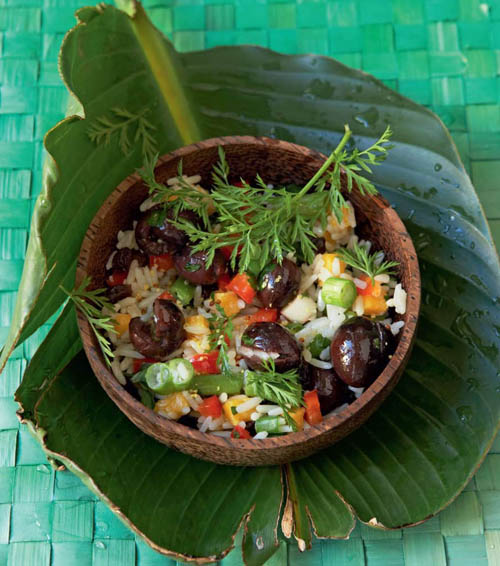
A rice salad is a bright, cheerful accompaniment to braai dishes.
- salt
- 6 cups water
- 2 cups uncooked white rice
- 1 cup seedless raisins
- 1 cup cooked green beans, cut into 1 cm lengths
- ¼ cup pitted olives
- ½ cup cubed cheddar cheese
- 4 spring onions, chopped
- ½ red pepper, chopped
- 1 tsp chopped fresh parsley
- salt and pepper
- cos lettuce for serving (optional)
- DRESSING
- 160 ml lemon juice
- 160 ml olive oil
- ½ tsp wholegrain mustard
- ¼ tsp sugar
- ¼ tsp salt
- Salt the water and bring it to the boil. Add the rice and raisins and simmer for 20 minutes. Fluff up the rice with a fork to separate the grains, then leave to cool before stirring in the remaining ingredients, except the cos lettuce (if using).
- To make the dressing, combine all the ingredients and drizzle over the rice.
- Serve on a bed of cos lettuce if you like. SERVES 4–6
THREE-BEAN SALAD WITH OLIVES
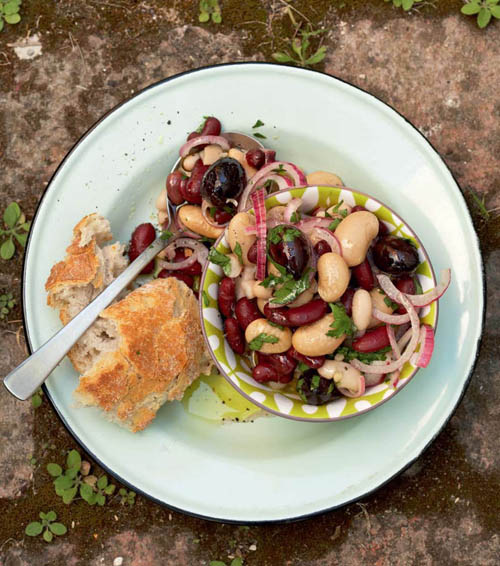
The only skill this salad requires is knowing how to use a can opener. The addition of a red onion and black olives gives it a special touch.
- 1 × 400 g can red beans, drained and rinsed
- 1 × 400 g can butter beans, drained and rinsed
- 1 × 400 g white beans, drained and rinsed
- 1 red onion, thinly sliced
- 12 pitted black olives
- 2 Tbsp chopped fresh parsley
- DRESSING
- ¼ cup olive oil
- 3 Tbsp red or white vinegar
- 2 cloves garlic, crushed
- 1 Tbsp lemon juice
- 1 tsp brown sugar
- 1 tsp salt
- freshly ground black pepper
- Mix all the ingredients together in a salad bowl.
- To make the dressing, whisk together the ingredients and pour over the bean mixture. Mix gently so as not to break the beans.
- Leave to stand for 1 hour before serving, for the flavour to develop. SERVES 4–6
RICE AND SWEETCORN SALAD
This simple salad can be made in advance for greater convenience, but if so, remember to keep it refrigerated and bring back to room temperature before serving.
- 2 cups water
- 2 cups uncooked white rice (preferably basmati)
- ¼ cup shelled peas
- 2 carrots, peeled and grated
- 2 cups cooked sweetcorn
- lettuce leaves for serving
- DRESSING
- 5 Tbsp olive oil
- 3 Tbsp red wine vinegar
- salt and freshly ground pepper
- Bring the water to the boil in a pot, then add the rice and cook, covered, for 10 minutes. Add the peas and cook for a further 5 minutes. Remove the pot from the heat and add the grated carrots and sweetcorn. Mix with a fork.
- To make the dressing, mix all the ingredients together and drizzle over the rice.
- Serve over a lettuce leaf on each plate. SERVES 4–6
BRINJAL SALAD
Grilling the brinjals releases a smoky flavour that is enhanced by the addition of spices.
- 4 large brinjals, cubed
- 4 Tbsp sea salt
- olive oil
- 1 cup cherry tomatoes, halved
- 1 red onion, finely chopped
- 1 Tbsp capers
- ciabatta bread for serving
- Greek yoghurt for serving
- cayenne pepper
- DRESSING
- ¼ cup olive oil
- 3 Tbsp lemon juice
- 3 cloves garlic, crushed
- ¼ tsp paprika
- 2 Tbsp chopped fresh coriander
- a pinch of sugar
- salt and pepper
- Sprinkle the brinjals with the sea salt in a colander, then leave to stand for 30–60 minutes. Rinse the brinjals and pat dry. Transfer them to a roasting pan and drizzle with a little olive oil then toss. Ensure that they’re lying in a single layer then place them under the grill until soft, but still firm. Transfer the brinjals to a bowl and add the tomatoes, onion and capers.
- Mix all the dressing ingredients together and pour over the brinjal salad. Toss gently.
- Serve on thick slices of bread topped with 1 tablespoon of yoghurt each. Sprinkle with the cayenne pepper and serve immediately. SERVES 4–6
CHICKPEA AND LENTIL SALAD
Both chickpeas and lentils are rich in protein. Lentils may vary in colour from yellow and red-orange to green, brown and black.
- 2 Tbsp olive oil
- 1 onion, chopped
- ½ tsp ground ginger
- 1 tsp ground cumin
- 1 fresh green chilli, finely chopped
- 200 g red lentils
- 1 × 400 g can chickpeas, drained
- salt and pepper
- 1 cos lettuce for serving
- DRESSING
- 6 Tbsp olive oil
- 6 Tbsp lemon juice
- 1 Tbsp wine vinegar
- 3 Tbsp chopped fresh parsley
- salt and pepper
- Heat the oil in a pot and sauté the onion until soft. Add the ginger, cumin, chilli and lentils. Stir thoroughly and pour in sufficient water just to cover the lentils, then simmer for 10 minutes or until all the water has been absorbed. Stir in the chickpeas and season to taste with the salt and pepper. Whisk together the dressing ingredients and pour over the chickpeas and lentils. Toss gently.
- Serve on a bed of lettuce. SERVES 4–6
CHICKPEA SALAD WITH BUTTERMILK DRESSING
Chickpeas with their high nutritional values are extensively cultivated in developing countries, particularly Ethiopia, Tanzania, Sudan and Kenya.
- 1 lettuce
- 1 × 400 g can chickpeas, drained
- 3 carrots, peeled and grated
- 6 cherry tomatoes
- 1 × 400 g can sweetcorn, drained
- 2 Tbsp sesame seeds
- DRESSING
- 150 ml buttermilk
- 4 tsp chopped fresh parsley
- 4 tsp wholegrain mustard
- 1 tsp brown sugar
- To make the dressing, mix all the ingredients together well. Separate the lettuce leaves without breaking them and arrange them in a serving dish. Toss the rest of the salad ingredients with the salad dressing. Spoon all on top of the lettuce leaves and serve immediately. SERVES 4–6
MEALIEPAP WITH ONION AND TOMATO SAUCE
Many traditional African dishes include pap. This may take the form of a smooth maize meal porridge or a crumbly phutu pap. Because pap can be dry, it is generally served with a tomato and onion sauce.
- 6 cups water
- 1 tsp salt
- 3 cups mealie meal
- SAUCE
- 4 Tbsp olive oil
- 3 onions, finely chopped
- 9 tomatoes, peeled and chopped
- 1 Tbsp tomato paste
- 1 beef stock cube
- ½ cup water
- salt and pepper
- In a pot, bring the water and salt to a boil and sprinkle in the mealie meal little by little, stirring with a wooden spoon. Reduce the heat until the mixture thickens, cover, and lower the heat. Cook over a low heat for 15 minutes.
- To make the sauce, heat the oil in a medium pot and sauté the onions until soft. Add the tomatoes and tomato paste and stir over medium heat until the tomatoes are very soft. Stir in the beef stock and water until the cube has dissolved. Simmer for 15 minutes then season with the salt and pepper. (Don’t forget that the beef stock is very salty.)
- To serve, spoon the mealiepap onto plates and ladle over the sauce. SERVES 4–6
SEASONAL VEGETABLES WITH PEANUTS
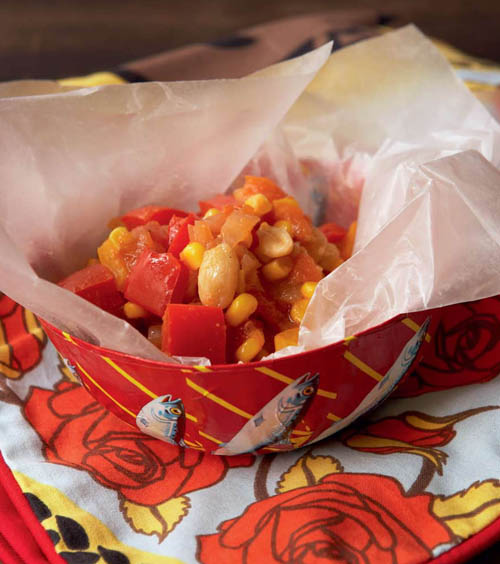
- 4 Tbsp olive oil
- 1 onion, chopped
- 1 tsp ground cumin
- ½ tsp chilli powder
- 3 tomatoes, peeled and chopped
- 1 cup raw peanuts
- 1 red pepper, diced
- 1 yellow pepper, diced
- ½ cup sweetcorn kernels
- salt and pepper
- Heat the oil in a pot and sauté the onion until soft. Add the cumin and chilli and stir for 2 minutes, then add the tomatoes and cook until they are soft. Finally, add the peanuts, peppers and sweetcorn and simmer gently for 20 minutes until the vegetables are cooked. Season with the salt and pepper.
- Serve with rice or mealiepap. SERVES 4–6
BUTTERNUT FRITTERS
A fritter comprises any kind of food that is coated in batter and deep-fried. The soft texture of butternut, as well as its natural sweetness combined with cinnamon-sugar, makes it the ideal fritter ingredient. In South Africa fritters are usually served as an accompaniment to a roast.
- 3 cups cooked and mashed butternut
- 50 ml cake flour
- 1½ tsp baking powder
- 1 egg, lightly beaten
- ½ tsp sugar
- a pinch of salt
- a knob of butter
- cinnamon-sugar (3 Tbsp sugar mixed with 1 tsp ground cinnamon)
- In a mixing bowl, combine the butternut, cake flour, baking powder, egg, sugar and salt.
- Heat the butter in a pan and drop in tablespoons of the mixture, frying both sides until brown. Sprinkle with the cinnamon-sugar. SERVES 4–6
BAKED CABBAGE WITH BACON AND POTATO
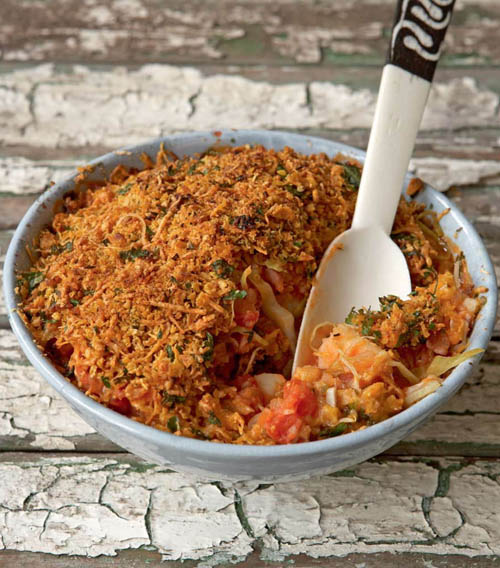
If you double the ingredient quantities this can be served on its own as a main meal.
- 3 potatoes, peeled and quartered
- 1 small cabbage, shredded
- 3 Tbsp butter
- 500 g rindless bacon, chopped
- 3 onions, chopped
- 1 × 410 g can peeled tomatoes
- salt and pepper
- 1 cup grated cheese
- 1 cup cornflake crumbs
- 2 Tbsp chopped fresh parsley
- Boil the potatoes until soft, then drain. Add the cabbage and butter and mash with a fork.
- Preheat the oven to 180 °c. Grease an ovenproof dish. Fry the bacon and onions until cooked, add the tomatoes and simmer for 5 minutes. Season with the salt and pepper. Combine with the cabbage mixture and adjust the seasoning if necessary. Turn the mixture into the prepared dish. Mix the cheese, cornflake crumbs and parsley and sprinkle on top. Bake for 30 minutes.
- SERVES 4–6
FUFU
Fufu is a staple food in West and Central Africa. Although the basic ingredients for it are plantains and fermented cassava, unripe bananas and yams (or sweet potatoes) also work well – the variations change according to the region. This popular version from Central Africa is eaten with beef, chicken or venison stews.
- 4 large unripe bananas (or plantains), peeled and washed
- 400 g yams, peeled and washed, or fermented cassava
- 3 Tbsp melted butter
- salt
- a pinch of cayenne pepper
- Slice the bananas and cut the yams into small chunks. Put them all into a large pot and add just enough water to cover. Cook for 20 minutes, or until tender. Drain the water and add the butter, salt and cayenne pepper. Blend in a food processor until smooth. Shape into small balls and serve with a beef stew. SERVES 4–6
EGYPTIAN CABBAGE ROLLS
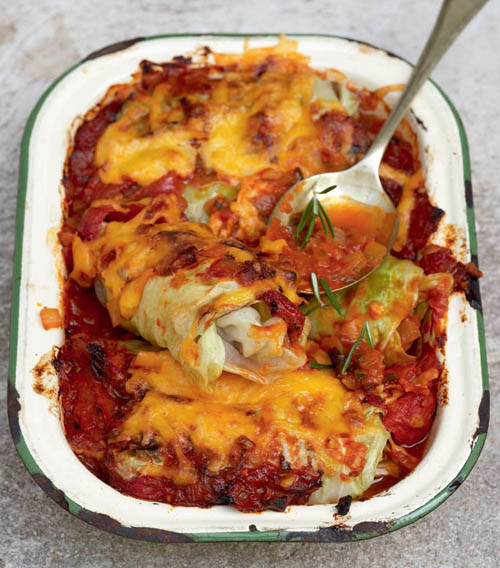
Egyptian cuisine shares many similarities with that of the Eastern Mediterranean. Stuffed cabbage leaves may be likened to the more famous dish using vine leaves. Egypt’s fertile Nile Valley and delta allows for the production of high-quality vegetable crops.
- 1 cabbage, leaves separated
- 3 Tbsp vegetable oil
- 500 g minced lamb
- 1 tomato, peeled and chopped
- 2 Tbsp fresh breadcrumbs
- salt and pepper
- 200 g cheddar cheese, grated
- TOMATO SAUCE
- 3 Tbsp olive oil
- 2 onions, chopped
- 2 cloves garlic, crushed
- 2 × 410 g cans peeled tomatoes
- 1 fresh green chilli, chopped
- 1 Tbsp chopped fresh parsley
- 8 basil leaves, chopped
- 18 pitted green or black olives
- salt and pepper
- Blanch the cabbage leaves in boiling water until just soft. Mix together the oil, mince, tomato, breadcrumbs and seasoning. Wrap 2 tablespoons of the mixture in each leaf, to form rolls. To make the sauce, heat the oil in a saucepan and sauté the onions and garlic until soft. Add the tomatoes, chilli, parsley and basil and cook for 30 minutes. Add the olives and season with the salt and pepper.
- While the sauce is cooking, preheat the oven to 180 °c. Pour half the tomato sauce in an ovenproof dish and arrange the cabbage rolls in the sauce. Pour the rest of the sauce over the rolls, sprinkle with the cheese and bake for 40 minutes. SERVES 4–6
ROASTED ROSEMARY POTATOES
This simple, inexpensive dish is full of flavour and is suitable for vegans as well as those on a gluten-free diet.
- 12 medium potatoes, washed and dried
- 3–4 Tbsp olive oil
- 3 Tbsp fresh rosemary
- sea salt and pepper
- Preheat the oven to 200 °c. Grease a roasting pan.
- Prick the potato skins with a fork, then arrange the potatoes in the roasting pan. Drizzle with the olive oil and sprinkle over the rosemary. Season with the salt and pepper and bake for 40 minutes. Serve immediately. SERVES 4–6
CHARMOULA POTATOES
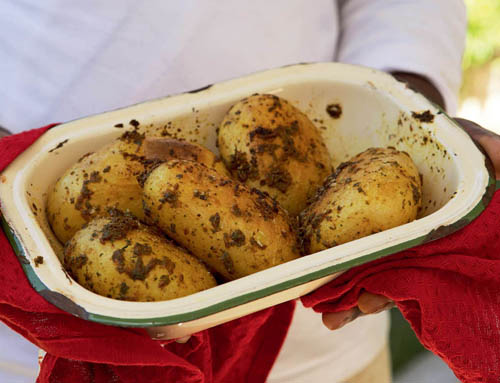
Charmoula marinade is used extensively in Algerian, Moroccan and Tunisian cooking and is an all-purpose North African sauce. The charmoula mix is quite spicy and goes well with fish, grilled meat or roasted vegetables.
- 6–8 potatoes
- 4 Tbsp olive oil
- sea salt and freshly ground black pepper
- CHARMOULA
- ½ tsp cayenne pepper
- 2 tsp turmeric
- 2 tsp cumin seeds
- ½ tsp salt
- ¼ cup chopped fresh coriander
- 2 Tbsp chopped fresh parsley
- 3 Tbsp white vinegar
- 3 Tbsp olive oil
- Preheat the oven to 200 °c.
- In a bowl, toss the potatoes with the olive oil, sea salt and pepper. Arrange them in a single layer in a roasting pan and roast for 30 minutes, or until cooked.
- Blend all the charmoula ingredients together and toss with the potatoes while still hot. SERVES 4–6
SWEET POTATO AND BUTTERNUT MASH
This lovely, sweetish and yellow-coloured mash makes a great change from the usual potato mash.
- 500 g sweet potatoes, peeled and cubed
- 500 g butternut, peeled and cubed
- 3 Tbsp butter
- 1 tsp brown sugar
- ½ tsp ground cinnamon
- ¼ cup milk
- ¼ tsp salt
- Boil the sweet potatoes and butternut for 10–15 minutes, or until cooked. Drain the water thoroughly, then add the butter, sugar and cinnamon. Mash until smooth, gradually adding the milk. Season with the salt. SERVES 4–6
SWEET POTATO CHIPS
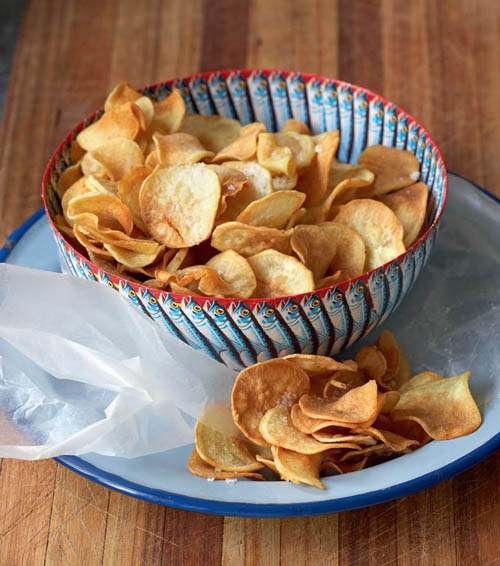
This is a variation on the usual potato chip theme. Sweet potatoes are vitamin rich, fat free and a good source of fibre. Baked and sprinkled lightly with sea salt, they make a tasty snack. Ensure that the oil is not too hot otherwise they will burn or appear to be ready before they are cooked through.
- 3 sweet potatoes, peeled
- 4 cups vegetable oil
- sea salt
- Slice the potatoes into very thin rounds, then wash and pat them dry. In a pot, heat the oil and deep-fry the potatoes in small batches at a time. Fry until golden brown, then remove and drain on paper towel to absorb the excess oil. Sprinkle with the salt. SERVES 4–6
HARISSA HOT CHILLI PASTE
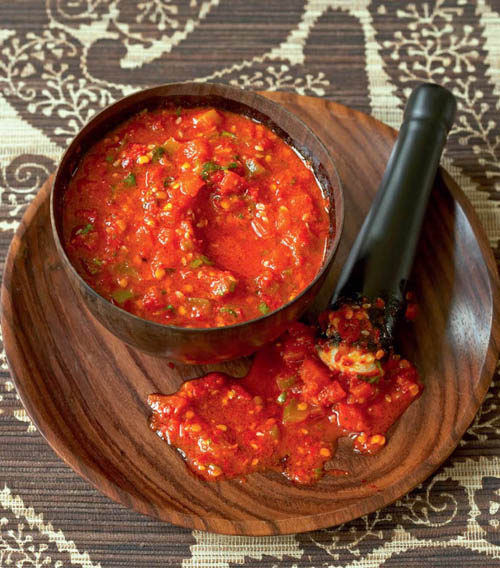
Harissa is often called ‘the flavour of North Africa’. It is particularly associated with Tunisia and is presented as a fiery chilli sauce often used in vegetable and meat tagines. However, harissa is also enjoyed in Algeria and Morocco and may be served as an accompaniment to couscous. Remember that red chillies are much hotter than green ones.
- 150 g fresh red or green chillies, deseeded and finely chopped
- 2 cloves garlic, crushed
- 1 green pepper, grilled, skinned and chopped
- 1 red pepper, grilled, skinned and chopped
- ¼ cup olive oil
- 2 Tbsp finely chopped fresh coriander
- 1 Tbsp sesame seeds, toasted
- 1 Tbsp ground cumin
- sea salt
- Combine all the ingredients and leave to stand for at least 30 minutes before using, for the flavour to develop. Store in a steralised jar in the refrigerator. SERVES 4–6
GARLIC POTATOES
This is such a simple dish yet very tasty with the combination of garlic and fried onion.
- 4 potatoes, cut into 1-cm cubes
- 5 cloves garlic, crushed
- 50 ml olive oil
- 1 tsp sea salt
- 2 Tbsp butter
- 1 large onion, sliced
- Fry the potatoes and garlic in the oil for 10 minutes, until golden brown (shaking the pan occasionally). Remove the potatoes from the pan and drain on paper towel to absorb any excess oil.
- Season with the salt and keep warm.
- In a clean pan, melt the butter and fry the onion until soft, then add to the potatoes and mix well to combine. SERVES 4–6
HUMMUS
Hummus, the Arabic word for chickpea dates back 7 000 years to the ancient Egyptians. In Spain chickpeas are known as garbanzo beans and in Italy they are called cece beans. Tahini is a ground sesame seed paste.
- 400 g cooked chickpeas or 1 × 400 g can chickpeas, drained
- 4 Tbsp lemon juice
- 4 Tbsp tahini
- 4 Tbsp olive oil
- 1 clove garlic
- ½ tsp salt
- olive oil for drizzling
- cayenne pepper to taste
- In a food processor, blend the chickpeas, lemon juice, tahini, olive oil, garlic and salt until smooth. Spoon into a bowl, drizzle with the olive oil and sprinkle with the cayenne pepper. SERVES 4–6
J’S SPICED FRUIT CHUTNEY
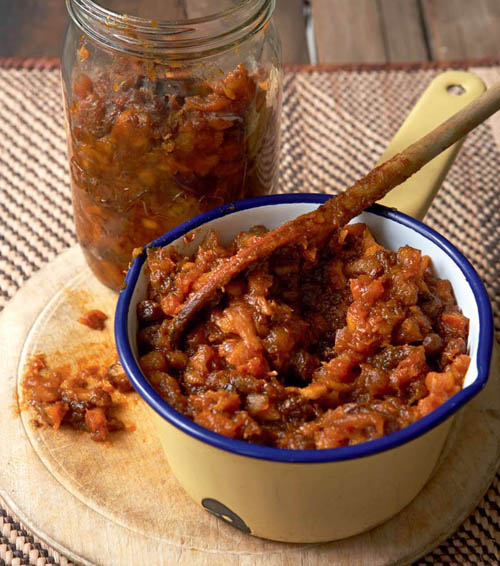
Chutney is a great accompaniment with many meals and is also a tasty ingredient for marinating and basting steak and meat dishes. Instead of using store-bought chutney, I decided to make my own – to have more control over the flavours. Because there are no preservatives in the chutney, store it in a sealed bottle and keep refrigerated for up to two weeks. But I don’t think it will even last that long as you’ll find excuses to enjoy it with everything!
- 300 g dried pears, chopped
- 300 g seedless raisins
- 300 g dried apricots, chopped
- 300 g pitted dates, chopped
- 300 g dried apple rings, chopped
- 4 cups water
- 300 ml white vinegar
- 200 g sugar
- 1 Tbsp chilli powder
- 1 tsp turmeric
- 1 tsp ground ginger
- 1 fresh green chilli
- In a large bowl, soak all the dried fruit in the water and vinegar for 4 hours. Transfer to a large pot and add the remaining ingredients. Simmer over a low heat for 2 hours, stirring every 15 minutes, until thick. Discard the whole chilli after cooking.
- SERVES 4–6
PRESERVED LEMONS
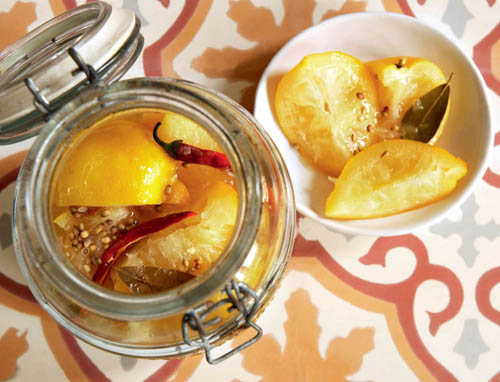
A traditional accompaniment to Moroccan dishes, these lemons are pickled in sugar instead of the usual salt, together with their own juice. It is important to remember that they need to be bottled for about three weeks before they are ready for use.
- 500 g lemons
- 4 cups water
- 300 g sugar
- 1 Tbsp lemon juice
- 4 bay leaves
- 1 tsp coriander seeds
- 1 fresh long red chilli, sliced
- Sterilise a preserve jar with 1-litre capacity.
- Wash the lemons and scrub them with a brush. Place them in a pot with the water, sugar, lemon juice and bay leaves, bring to the boil and simmer for 30 minutes. Once cooled, cut the lemons into quarters and remove the pips.
- Heat the sterilised jar in hot water, then pack the lemons into it with the coriander seeds and chilli. Boil the syrup again then pour into the jar. Seal immediately.












